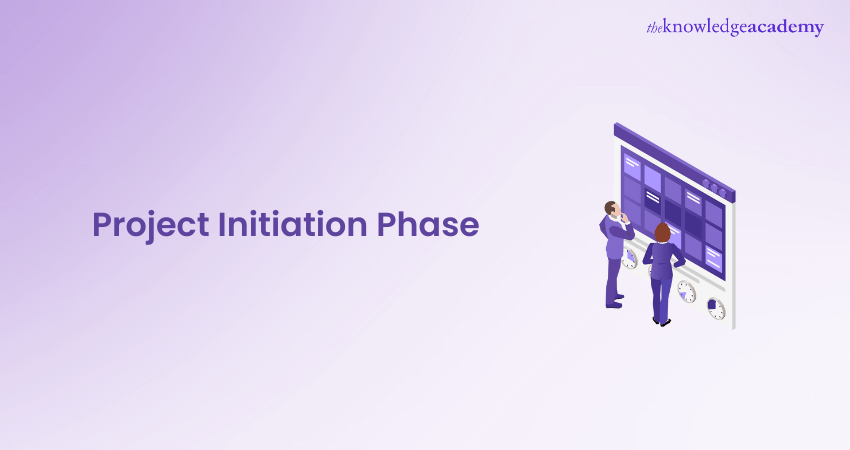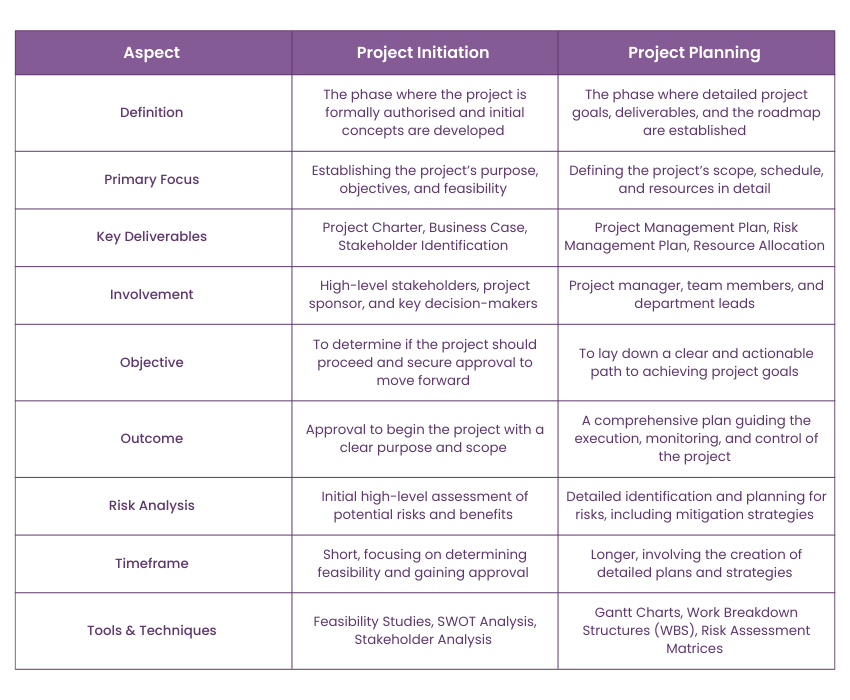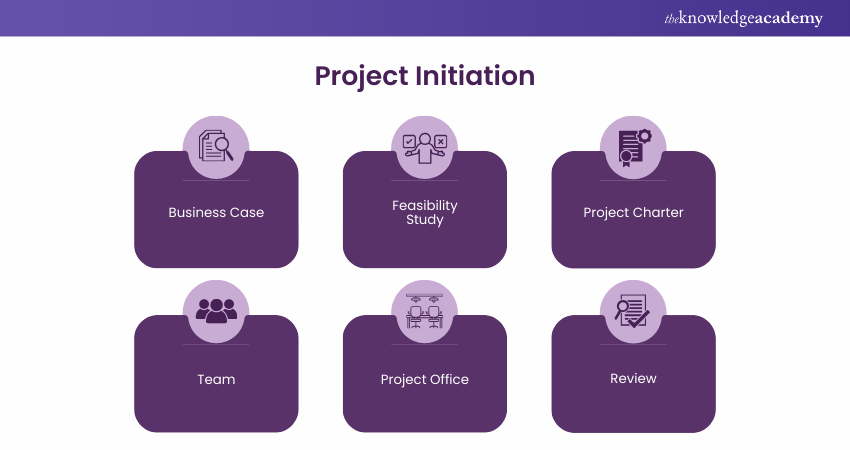We may not have the course you’re looking for. If you enquire or give us a call on + 1-866 272 8822 and speak to our training experts, we may still be able to help with your training requirements.
Training Outcomes Within Your Budget!
We ensure quality, budget-alignment, and timely delivery by our expert instructors.

Picture yourself going on a trip across the country. Would you start without a map, a plan, or knowing your destination? Similarly, in Project Management, the Project Initiation Phase is your roadmap to success. This crucial phase sets the stage for everything that follows, ensuring you have a clear direction and the necessary resources.
Additionally, this phase is about laying a strong foundation, identifying key stakeholders, and defining clear objectives. Let’s dive into the details of the Project Initiation Phase and discover the steps that will lead you to successful Project Management.
Table of Contents
1) What is the Project Initiation Phase?
2) Project Initiation vs Project Planning
3) Why is Project Initiation Important?
4) Steps in Project Initiation
5) Conclusion
What is the Project Initiation Phase?
Project Initiation is the starting phase of the Project Management Process. In this phase, companies study the Project and secure the buy-in information from clients. This phase is a part of the five phases of the Project Management lifecycle developed by the Project Management Institute (PMI).
The main objective of this phase is to study the Project’s feasibility and understand the business value. Usually, a Project Manager creates a Project proposal that contains Project approval and a Project plan in this phase.
Project Initiation vs Project Planning
Understanding the distinction between Project Initiation and Project Planning is crucial for effective Project Management. Below is a comparison of Project Initiation vs Project Planning:

Why is Project Initiation Important?
Embarking on a fresh Project is thrilling, but you must verify its potential value before delving into the planning stage. This is where Project Initiation Phase plays a vital role, providing a methodical framework to the Project's business rationale. Moreover, Project Initiation ensures early engagement with stakeholders. It also facilitates the acquisition of necessary resources, enhancing project visibility, and preventing potential obstacles in the future

Learn the basics of Project Management through our Project Management Office Fundamentals Certification – join us now!
Steps in Project Initiation
Initiating a project involves several critical steps to ensure its success. Below are the key steps in Project Initiation:
1) Create a Project Charter or Business Case
a) Define the Project Scope: Clearly outline what the project will deliver and the boundaries within which it will operate.
b) Set Objectives and Goals: Establish what the project aims to achieve, including specific, measurable, achievable, relevant, and time-bound (SMART) goals.
c) Identify Constraints and Assumptions: Note any limitations or assumptions that could impact the project.
2) Identify Key Stakeholders and Pitch Your Project
a) Stakeholder Analysis: Identify all individuals or groups who have an interest in the project and assess their influence and impact.
b) Develop a Communication Plan: Create a strategy for how you should communicate with stakeholders throughout the project.
c) Prepare Your Pitch: Tailor your presentation to address the interests and concerns of different stakeholders, highlighting the benefits and value of the project.
3) Run a Feasibility Study
a) Technical Feasibility: Assess whether the project can be completed with the available technology and resources.
b) Economic Feasibility: Evaluate the cost-benefit analysis to ensure the project is financially viable.
c) Operational Feasibility: Determine if the project can be integrated into existing operations and if it will be accepted by stakeholders.
Equip yourself with the tools to manage projects effectively - register for our Project Management Certification now!
4) Assemble Your Team and Tools
a) Define Responsibilities: Clearly outline the duties and responsibilities of each team member.
b) Select Tools and Methodologies: Choose the appropriate tools and Project Management Methodologies that will support Project Management and execution.
c) Team Building: Foster a collaborative and motivated team environment through team-building activities and clear communication.
Conclusion
In conclusion, the Project Initiation Phase is not just the starting point; rather it’s the cornerstone of successful Project Management. By meticulously planning and engaging stakeholders early on, you can set the stage for a project that not only meets its goals but exceeds expectations. So, embrace this phase and watch your projects thrive from the very beginning!
Gain unparalleled expertise in Project Management – sign up for our Project Management Office Black Belt Course and lead your team to success!
Frequently Asked Questions

As the initial step, Project Initiation phase includes multiple pitfalls. Some of those pitfalls include poor Project planning, poorly defined Project goals, defective communication, unrealistic expectations, and so on.

You can adopt a handful of tactics to measure the Project Initiation phase’s progress and success. The most common strategies include scheduling baseline, projecting budget, assuring quality, satisfying the stakeholder, and so on.

The Knowledge Academy takes global learning to new heights, offering over 30,000 online courses across 490+ locations in 220 countries. This expansive reach ensures accessibility and convenience for learners worldwide.
Alongside our diverse Online Course Catalogue, encompassing 17 major categories, we go the extra mile by providing a plethora of free educational Online Resources like News updates, Blogs, videos, webinars, and interview questions. Tailoring learning experiences further, professionals can maximise value with customisable Course Bundles of TKA.

The Knowledge Academy’s Knowledge Pass, a prepaid voucher, adds another layer of flexibility, allowing course bookings over a 12-month period. Join us on a journey where education knows no bounds.

The Knowledge Academy offers various Project Management Courses, including the Project Management Office Fundamentals Course, Programme Management (PgM) Fundamentals Training, and Jira Training. These courses cater to different skill levels, providing comprehensive insights into the Digital Project Management Process.
Our Project Management Blogs cover a range of topics related to Project Management, offering valuable resources, best practices, and industry insights. Whether you are a beginner or looking to advance your Project Management skills, The Knowledge Academy's diverse courses and informative blogs have got you covered.
Upcoming Project Management Resources Batches & Dates
Date
 Introduction to Project Management Course
Introduction to Project Management Course
Fri 17th Jan 2025
Fri 21st Feb 2025
Fri 4th Apr 2025
Fri 6th Jun 2025
Fri 25th Jul 2025
Fri 7th Nov 2025
Fri 26th Dec 2025







 Top Rated Course
Top Rated Course



 If you wish to make any changes to your course, please
If you wish to make any changes to your course, please


